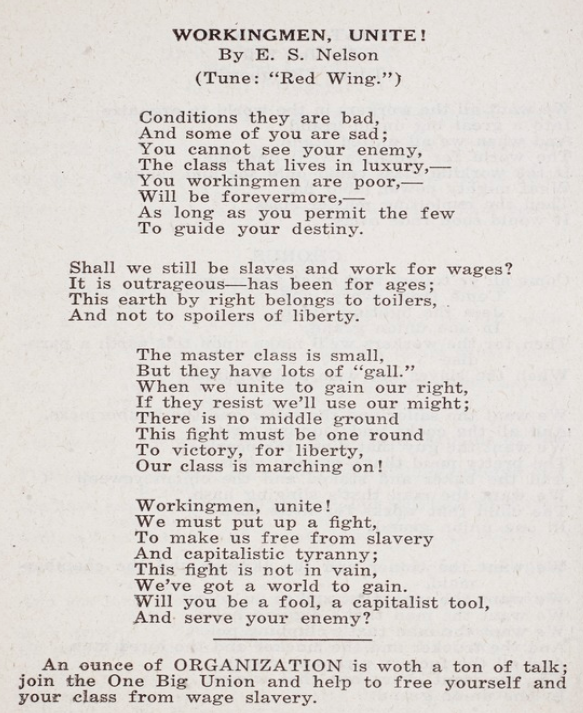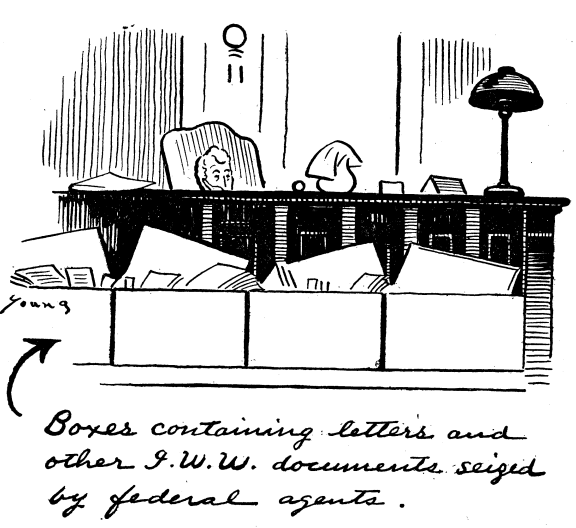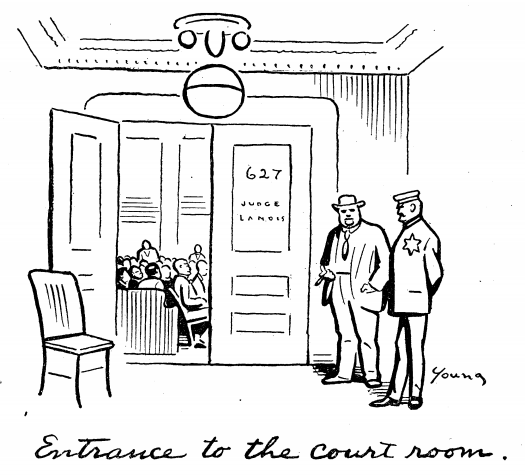Remember, this is the only
American working-class movement which sings.
Tremble then at the I. W. W.,
for a singing movement is not to be beaten.
-Jack Reed
~~~~~~~~~~~~~~~~~~~~~~~~~~~~~~~~~~~~~~~~~~~~~
Hellraisers Journal, Thursday September 5, 1918
Chicago, Illinois – “Take care, most arrogant master-class…”
From The Liberator of September 1918:
Part IV of John Reed’s coverage of Chicago I. W. W. trial with drawings by Art Young-
The Social Revolution In Court
By Art Young And John Reed—–
—–Day after day, all summer, witness after witness from the firing-line of the Class Struggle has taken the stand, and helped to shape the great labor epic; strike-leaders, gunmen, rank and file workers, agitators, deputies, police, stool-pigeons, Secret Service operatives.
I heard Frank Rogers, a youth grown black and bitter, with eyes full of vengeance, tell briefly and drily of the Speculator mine fire, and how hundreds of men burned to death because the company would not put doors in the bulk-heads. He spoke of the assassination of Frank Little, who was hung by “vigilantes” in Montana, and how the miners of Butte swore to remember…. (In the General Headquarters of the I. W. W. there is a death mask of Frank Little, blind, disdainful, set in a savage sneer.)
Oklahoma, the tar-and-feathering of the workers at Tulsa; Everett, and the five graves of Sheriff McRae’s victims on the hill behind Seattle… all this has come out, day by day, shocking story on story. I sat for the better part of two days listening to A. S. Embree telling over again the astounding narrative of the Arizona deportations; and as I listened, looked at photographs of the miners being marched across the arid country, between rows of men who carried rifles in the hollow of their arms, and wore white handkerchiefs about their wrists.
Everyone knows how the deportees were loaded on cattle-cars, how the engineer, protesting, was forced to pull the train out, and how finally, arriving at Columbus, New Mexico, the train was ordered back and finally halted in the desert, where United States troops saved the wretched people from exposure and starvation. Many of the deportees had wives, families and property in Bisbee, some were not I. W. W.’s at all, and others had no connection with the labor movement in any way; a large number of the men owned Liberty bonds, and many were registered in the Draft.
At first the committee of the deportees telegraphed to Wiley E. Jones, Attorney General of the State of Arizona, as follows:
Sentiment of the men deported from Bisbee is that they wish to return to their homes immediately, but they are aware that their arrival may cause acts similar to those of July 12th. We wish to avoid any breach of the peace, and so respectfully suggest that you incorporate in your report some method by which we will be enabled to return to our homes with adequate protection. We feel that we are not justified in longer accepting alms from the Federal Government so freely offered us in the situation forced upon the Government by the action of a lawless mob.
And to Thos. Campbell, Acting Governor of Arizona:
On account of the troublesome times in the nation and the state, our men do not wish to be the means of causing any breach of the peace. We respectfully demand protection for return to our homes.
To the Hon. Wm. B. Wilson, Secretary of Labor:
Will the Federal Government restore and make secure the constitutional rights of the men deported from Bisbee?… Or does the Federal Government join hands with the state of Arizona in thus notifying the people of America that its common citizens have no rights worthy of consideration by men elected and sworn to uphold the constitution?
And again, to the Secretary of Labor and the President:
Federal Constitution was violated when striking miners were deported from Bisbee. We are remaining here not because we want to be idle at Government expense, but because we believe that the Federal Government will return us to our homes and give us protection. Please say what the Government intends to do.
After a few weeks the blankets issued to the deportees were withdrawn, and a notice was posted up in the camp, saying briefly that beginning on the morrow the food allowance would be cut down, and would continue to be reduced until at last nothing would be given. All telegraphic protests and queries about this brought no answer.
—–And so it was done, until the deportees were driven out of camp, to crawl home, without protection, the best way they could.
They telegraphed to the President, the Secretary of Labor, the Department of Justice, to Senator La Follette, Congressman Meyer London, Congresswoman Jeanette Rankin….
The deportees intend to remain here insisting upon the restoration of their rights as citizens. If the Federal Government withdraws its support now the deportees will be in the same position as when the Government first came to their aid in Hermanas. Does a delay of two months nullify the rights guaranteed us by the Constitution? A definite answer is requested….
To all these telegrams there were just three replies. Tumulty answered that the matter would be brought to the attention of the President; Jeanette Rankin answered encouragingly, and made a fight for the deportees; Meyer London was silent; but the bitterest irony of all was a letter from the Department of Justice in Washington:
September 29th, 1917.
MR. A. S. EMBREE,
SIR:Your letter of the tenth inst. with reference to the deportation of yourself and other persons from the state of Arizona to Columbus, New Mexico, has been referred to this department, and the statements and arguments made by you therein have received careful consideration. This department does not believe, however, that there is any Federal law referred to by you which would justify action by the Department of Justice.
Respectfully,
For the Attorney General,
WILLIAM C. FITTS,
Asst. Attorney General.There is no law, then, which can be invoked to prevent the inter-state deportation of workmen by private persons with guns! I believe that this letter will take its place in history beside that other great utterance of irresponsibility, ” Let the people eat grass!”…
I sat listening to a very simple fellow, an agricultural worker named Eggel, who was telling how the “vigilance committees” and the gunmen from the towns of the Northwest hunted the I. W. W. farm-hands. Without emotion Eggel described how he and others were taken off a train at Aberdeen, South Dakota, and beaten up.
One man would sit on your neck, and two men on your arms, and two on your legs, while a detective, Price I think was his name, beat us up with a 2-by-4, and it was criss-crossed, notches made on it, this way and that way, so it would raise welts on a man…beat you over the back and your hips…..
So they took me away in one automobile, and they took Smith in another, and then they gave me another beating. So after that third beating I came back to Aberdeen, and slunk in at night, and I slept beneath a livery barn, and the next day I crept down to the depot and took a train for North Dakota….
Listen to the scriptural simplicity of this:
Well, they grabbed us. And the deputy says, “Are you a member of the I.W.W.?” I says,”Yes'”; so he asked for my card, and I gave it to him, and he tore it up. He tore the other cards up that the fellow-members along with me had, so this fellow-member says, “There is no use tearing that card up, we can get duplicates.” “Well,” the deputy says, “we can tear the duplicates up too.”
And this fellow-worker says, he says, “Yes, but you can’t tear it out of my heart.”
The humility of the workers is beautiful, the patience of the workers is almost infinite, and their gentleness miraculous. They still believe in constitutions, and the phrases of governments-yes, in spite of their preamble, the I. W. W. still have faith in the goodness of mankind, and the possibility of justice for the righteous.
Take care they do not lose this valuable quality. Take care, most arrogant master-class in the history of the world-call off your Vigilantes, and all of your hypocritical flim-flam which is invented in wartime to enslave the workers.
It will be an evil day for you if Tom Mooney hangs; it will be an evil day for you if the I. W. W. goes to jail- singing in a deeper tone, as one of its young poets, M. Robbins Lampson, is singing:
“Justice became a harlot long ago
And sold herself to every master’s use.
Though some declare she died still pure, I know
She compromised with Death, and signed a truce
With Shame, who took her to his splendid house….”—–
———-[Part IV & conclusion.]
~~~~~~~~~~~~~~~~~~~~~~
SOURCE & IMAGES
The Liberator
(New York, New York)
https://www.marxists.org/history/usa/culture/pubs/liberator/
-September 1918
John Reed on Chicago IWW Trial
-with Drawings by Art Young, page 20
https://www.marxists.org/history/usa/culture/pubs/liberator/1918/07/v1n07-sep-1918-liberator.pdf
See also:
The Truth about the IWW
Facts in Relation to the Trial at Chicago
National Civil Liberties Bureau, 1918
https://books.google.com/books?id=G1I2AQAAMAAJ
Evidence and cross-examination of J.T. (Red) Doran
in the case of the U.S.A. vs. Wm. D. Haywood et al.
IWW GDC, 1918
https://catalog.hathitrust.org/Record/100663081
Haywood at Chicago IWW Trial
Evidence and cross examination of William D. Haywood
in the case of the U.S.A. vs. Wm. D. Haywood, et al.
Chicago, General Defense Committee, 1918
https://catalog.hathitrust.org/Record/003309919
The I.W.W. Trial
Story of the Greatest Trial in Labor’s History
by one of the Defendants
-by Harrison George
—-with introduction by A. S. Embree.
IWW, Chicago, 1919
https://catalog.hathitrust.org/Record/100663067
~~~~~~~~~~~~~~~~~~~~~~~~~~~~~~~~~~~~~~~~~~~~~
Workingmen, Unite! by E. S. Nelson
https://digital.wolfsonian.org/WOLF045327/00001/14j



